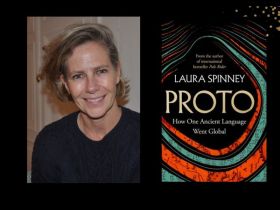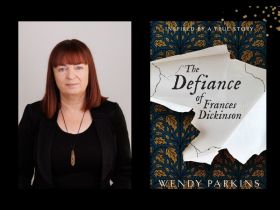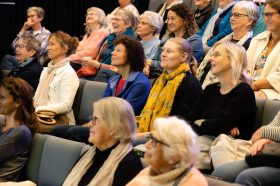Book cover image: The Anna Karenina Fix – Life Lessons from Russian Literature by Viv Groskop via Penguin Australia.
Viv Groskop harbours an intoxicating passion for Russian literature. In The Anna Karenina Fix she has used humour; personal reminiscences, and her knowledge of Russia and the Russian people. Using her deep understanding of the greatest Russian writers, Groskop excites such interest in them that you will irresistibly want to rush out and buy if not War and Peace at least something by Pasternak or Pushkin.
Groskop admits that the ‘Russian classics are … not the most obvious place to look for tips for a happier life. Russian literature is full of gloomy people wondering how on earth they have ended up in the appalling predicament in which they find themselves.’ But she also contends that those same Russian classics teach us that inconvenience, annoyance and even disaster can be survived and that life can be enjoyed.
At the start of the book the reader is treated to a brief and amusing tutorial into ‘those funny Russian names’ and at the end there is some good advice on recommended reading for those interested in digging deeper into what classical Russian literature has to offer. In between are 11 chapters, each devoted to a particular author and work. Dostoevsky makes an appearance with Crime and Punishment. Tolstoy appears in the first chapter with Anna Karenina and in the last chapter with War and Peace.
For those who have supposedly failed to read this extraordinary book, Groskop has some good advice:
‘One of the most important things about [War and Peace] for anyone who hasn’t read it, and for anyone who has tried to read it and supposedly ‘failed’, is to understand that to read this novel is not a one-off task. Reading [it] is the the work of a lifetime. There’s no such thing as ‘failing’ to read War and Peace. You just haven’t got enough practice in yet.’
In each chapter the reader learns something of the background of the particular Russian author under focus, gains a deeper understanding of the work discussed, and gleans some extra revelations about that author’s life and personality. It is a fascinating and engrossing combination. Whether knowing more about an author helps to better understand their work can be questioned, but as Groskop here demonstrates, knowing how a book came to be written in the first place can be very enlightening. And knowing more about what was going on in the world the author was inhabiting at the time of writing also gives the reader a better understanding of the author’s intentions.
This is particularly so in the case of Requiem by the extraordinary and courageous poet Anna Akhmatova. She could not commit her anti-Stalinist poetry to writing for fear of the KGB so her poems had to be remembered. Fortunately she had many friends who learned her work in secret, in particular one friend who had a gift for remembering poetry, so eventually Requiem and Akhmatova’s other works could be published.
Often the best and most easily understood explanations of complex matters come from a person who is extremely skilled in their particular field. This is the case with Groskop and classical Russian literature; it is exemplified in The Anna Karenina Fix.
5 stars out of 5
The Anna Karenina Fix – Life Lessons from Russian Literature
By Viv Groskop
Hardback
9780241308639
October 16, 2017
Fig Tree
320 pages





